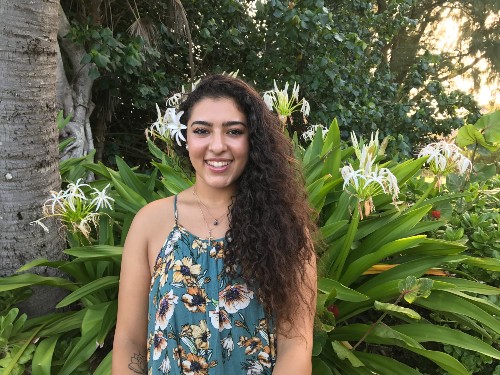Discussing ‘Spirit in the Time of Radical Change’
What is faith? What is spirit? And, how do you approach climate change from the different spiritual traditions? These were the three primary questions addressed during a discussion sponsored by the BDK-Fujitani Interfaith Program, which marks its 20th anniversary this year at Chaminade University. Originally named the Bukkyo Dendo Kyokai Reverend Fujitani Interfaith Program, the curriculum’s purpose is to bring together the Buddhist community with all other religious communities in Hawaii to promote interfaith dialogue, and to provide opportunities for understanding and action for peace and justice in our communities.
In a conversation themed, “Spirit in the Time of Radical Change,” panelists included Native Hawaiian practitioner Manulani Aluli Meyer, Buddhist David Atcheson, Indian Vedic specialist Akhilesh Tiwari and Mary Anne Magnier of Honolulu Friends Meeting, which is an open and affirming congregation that welcomes everyone.
“I’ve never moderated anything in my life,” says Chaminade sophomore La‘a Gamiao ’25, who was tasked to lead the discussions. “I was really nervous, but I knew I had to be myself.”

Established in 2003 and named in honor of Yoshiaki Fujitani, a past president of BDK Hawaii, the program in the past has featured lectures, which were either usually based on a single speaker or based on panel discussions during which each panelist is given the floor to present his/her religious perspectives. The presentations would be followed by discussion among the panelists, and later opened to the audience for a Q&A session.
“I was involved with the BDK-Fujitani Interfaith program years before Brother Bernie (Ploeger, Chaminade’s fomer President) stopped me in the hallway of Henry Hall and asked me to take over the program,” recalled Sr. Malia Wong, D.Min, Program Director for Chaminade’s BDK-Fujitani Interfaith Program. “He knew of my long involvement with the interfaith community in Hawaii and globally, but I felt I wasn’t ready to assume the position—especially moderating—and I deferred the position to Regina Pfeiffer.
In 2017, Cheryl Edelson, Dean of the School of Humanities, Arts and Design, asked associate professor Pfeiffer, D.Min., to fill the role as the head of Religious Studies. “Thus, I formally became program director of the BDK-Fujitani Interfaith Program, finally fulfilling Bro. Bernie’s wishes,” Wong laughed.
Upon the suggestion of Manulani Meyer, a moderator would be appointed to ask the question to the panelists, who would then be given a chance to respond. Wong explained that this format took a lot more preparation on the back end, not being quite sure how to organize the program so that it flows.
“Thus, I designed it with La‘a as the host and at the helm asking questions, and allowing discussions to grow organically.” Wong said. “The last part of the program included networking and continuing the conversation on the lanai with vegan pupu. It was like being with family and friends with the ease of interaction among guests of the different faith traditions. This will be our new format going forward—open to adaptation and change, a Marianist characteristic of education.”
For someone who has never moderated a discussion, La‘a was grateful that he was chosen as the first student host, despite his initial fears and nervous shakes.
“If you don’t answer, you’ll never know your character,” said Gamiao of agreeing to be the discussion’s moderator. “I put myself out there and the fact that I said yes, I think, says a lot about my character.”




 Sr. Malia, a religious studies senior lecturer with Chaminade University’s Division of Humanities and Fine Arts, co-led a Christian-Buddhist dialogue entitled “Wisdom and Insight: Cross-cultural Perspectives.” She joined the Venerable Karma Lekshe Tsomo, Ph.D. in discussing how their respective religions help bring about a more peaceful society.
Sr. Malia, a religious studies senior lecturer with Chaminade University’s Division of Humanities and Fine Arts, co-led a Christian-Buddhist dialogue entitled “Wisdom and Insight: Cross-cultural Perspectives.” She joined the Venerable Karma Lekshe Tsomo, Ph.D. in discussing how their respective religions help bring about a more peaceful society. Sr. Malia, who attended the event through a Chaminade faculty development award, helped create a photo collage that served as the formal
Sr. Malia, who attended the event through a Chaminade faculty development award, helped create a photo collage that served as the formal 


